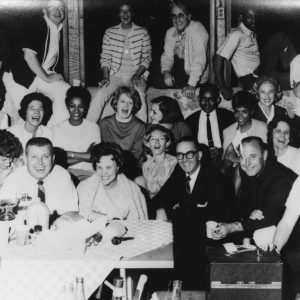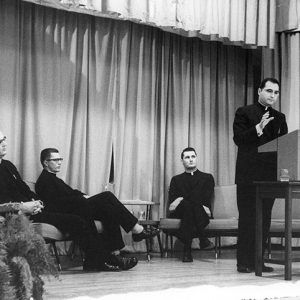calsfoundation@cals.org
Just Communities of Arkansas (JCA)
With its roots in preceding organizations, Just Communities of Arkansas (JCA) is a social justice and equity organization based in Little Rock (Pulaski County) that educates individuals of all ages on the value of diversity. The organization’s mission is to create “a place where every person is valued, every voice is heard, and everyone has a fair chance to succeed.” Over time, its focus has expanded from fighting religious and racial bigotry, with recent work increasingly centered on issues such as immigrant and LGBT (lesbian, gay, bisexual, and transgender) rights.
After a quarter century of efforts, the National Conference of Christians and Jews (NCCJ) organized a field office in Little Rock in 1964. To match its broadening mission, in the mid-1990s, the national organization changed its name to the National Conference for Community and Justice, maintaining its acronym NCCJ. In 2005, facing a financial crisis that ultimately resulted in the shutdown of its office, the national NCCJ shifted from its traditional structure with power concentrated in the national organization to a collection of autonomous regional offices like that in Little Rock. Soon thereafter, the Arkansas NCCJ moved away from its mother organization and became, first, Just Communities of Central Arkansas (JCCA) and then, in 2009, Just Communities of Arkansas.
During its initial years in Arkansas, NCCJ was active in the education of teachers in how they might improve religious and race relations. The organization formed its Youth Council in 1966. NCCJ was also a base of support for the Arkansas Council on Human Relations in its civil rights work. More visibly, the regional director of the NCCJ hosted, for a brief period, a half-hour television and radio series titled New Horizons in Human Relations.
The organization highlighted a Humanitarian of the Year at its annual Brotherhood Dinner, identified as the first integrated social event in the city. The first recipient, in 1964, was former congressman Brooks Hays. At the height of the civil rights era, the second dinner was disrupted by a bomb threat that led to an evacuation before the completion of the program. In the early years, the large dinners were televised live. The dinner remains a hallmark event for the organization. Over the years, honorees have included governors and other political leaders, religious leaders, business leaders, athletes, and actors.
In the 1970s, NCCJ expanded its work into new turf such as criminal justice and labor relations. Still, the organization stayed true to its roots in interreligious dialogue work such as providing Christian and Jewish speakers throughout the public school system after the broadcast of the high-profile television mini-series Holocaust. In 1979, the Arkansas region was lauded for its program on biomedical ethics; it laid the foundation for the development of a medical ethics department at the University of Arkansas for Medical Sciences (UAMS).
A series of workshops promoting interracial dialogue among youth and adults was begun in the late 1980s and early 1990s as religious issues became less of a focus of the organization’s work. These included the Anytown summer camp for youth (renamed Ourtown for Teens in 2006), an anti-prejudice workshop for all teachers and staff members in Pulaski County’s three school districts, and the Ourtown adult program for civic and community leaders.
In 1987, the organization created a second award, honoring Catholic priest and social justice advocate Father Joseph H. Biltz. This award, recognizing one or more individuals or groups engaged in significant social change work, is given annually at JCA’s Gathering of Friends event. In 2000, the organization began an annual walk in downtown Little Rock, now called Walk for Community, as a major community event and fundraiser.
JCA, more recently, has expanded youth work to younger children, with a focus on combating bullying. Topically, the educational work was expanded to a series of panels called “Straight Talk,” in which LGBT Arkansans and their family members explain what it is to be LGBT in the state. While JCA occasionally engages in advocacy work through public statements and joining litigation as a “friend of the court,” the organization continues to focus its efforts on educational activities.
For additional information:
Just Communities of Arkansas. http://www.arkansasjustcommunities.org/ (accessed November 19, 2025).
National Conference for Community and Justice Records. Butler Center for Arkansas Studies. Central Arkansas Library System, Little Rock, Arkansas. Finding aid online at https://cdm15728.contentdm.oclc.org/digital/collection/findingaids/id/4714/rec/1 (accessed November 19, 2025).
Shepherd, Ruth D. The Company We Keep: 50 Years of Arkansans Creating Just Communities. Little Rock: Butler Center Books, 2013.
Jay Barth
Hendrix College

 Just Communities of Arkansas
Just Communities of Arkansas  Racism Seminar
Racism Seminar 



Comments
No comments on this entry yet.